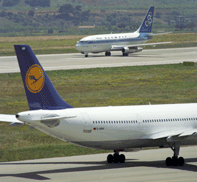 'Quintessentially British' Hobby Sparks Diplomatic Furor By Ivo Wengraf Special to Hellenic Communication Service |
|||
The spotting of planes has, recently, moved from being a quaint hobby for failed fighter pilots and into the world of international diplomacy. Twelve Britons made a visit to Greece last year, eager to have a look at one of the most interesting air forces in the EU. After months of waiting, going out there, coming back, and complaining about Greek courts, Greek prisons, and, well, Greeks, they are now back here in Britain. Safe and sound; six with three year jail terms, six with one year suspended sentences. The likes of the London Daily Mail and - dare I say it - Her Majesty's Government have attacked these arrests and convictions as an absurd misunderstanding. These Greeks, they will have us believe, are barbaric, because, after all, you cannot be guilty in Greece if it is not a crime in Britain. Of course. I forgot. The Greeks, by their own admission, do not understand the hobby of plane spotting. The Hellenic Air Force is fairly small, and unlike its British counterpart, it has a fairly low public profile. During an Air Force open day near Kalamata, these twelve were arrested for suspicious activity. It is vital to remember that Greece is in a long-standing, almost "cold war" situation with Turkey and is also in a unique position for NATO in the Balkans and the Middle East. They, quite understandably, do not take their military issues lightly. This whole plane-spotting story raises important questions about the EU, the role of foreign governments in the justice system and influence of the media. I do not for one moment suggest that these twelve tourists were spies for Britain or anyone else. However, that is not to say that they are therefore innocent of espionage as understood by the Greeks and their laws. At my most charitable, I still must say that these people are extremely stupid.
From what I understand of the hobby and of the Greek military, the Hellenic Air Force was so interesting to plane spotters because they famously shunned the attention of the spotters. Greece is a most unwelcoming nation for plane spotters, and these people knew that; that is why they went there. Despite warnings to exercise caution and to avoid taking photographs, the twelve had cameras at the ready and may even have been drinking. One does not have to be a member of Mensa to see that they were on thin ice already. As one would expect in a nation constantly under threat of war from a far larger and more well armed army (Turkey), the police picked these hobbyists up and sent them to Nafplio prison after they were caught doing something they should not have done. Immediately there was an outcry from the writers of the Mail and the other jingoistic crackpots in the UK media. The high security prison was criticised, despite the gravity of the charges. The Greeks, as a general rule, do not build minimum-security prisons for white-collar criminals. To put it simply, they do not have enough criminals to warrant variety in incarceration. Prisons are prisons in Greece. The Americans have "Club Fed", where criminals can view prison as a chance to watch their cholesterol. The Greeks have no equivalent. During their interrogations, Paul Coppin, their leader, failed to reveal a trip to Turkey (where he was invited by the Turkish government to a Turkish Air Force function). The Daily Mail's man in Kalamata knew this, but "had not seen the importance" of this particular tidbit. He merely had to look at the Greek football league, where many clubs are in forced exile from modern Turkey, to see some of the history of Greco-Turkish relations and to understand that this might be worth telling the authorities. Whilst they complained about the prison, the British consul called it more than satisfactory. When the one woman of the party said she was cold, the Greek Foreign Minister's office sent her a selection of woollen sweaters. So far in the story, they have ignored good advice from the spotting fraternity, failed to disclose to security officials all of their movements, concealed evidence from both the police and the British public, complained about being in prison while they were under arrest and used the Mail to bully the British public into bullying our government into bullying their government into wrongly interfering with their justice system. As their own lawyer said, they "did not help themselves". And he is meant to be on their side. The British: Above the Law? The EU, despite harmonisation, is still a group of more-or-less culturally and legally independent states. Because I can drive at 100 miles an hour down a German Autobahn, it does not allow me to do similar down a British motorway. No one would question the legality of the arrest of a Briton in France, say, for a French crime. However, once we move onto Spain and Greece, the "banana republics without bananas", it suddenly becomes a different story. There are differences between EU states, but these differences do not extend to the ability (or lack there of) to write and use laws properly. Plane spotting can be viewed as crime in Greece. So be it. Britain cannot be the sole judge of guilt throughout the world. As we in Britain are famously unable to write our own constitution, how can we demand to re-write the Greek one? The use of diplomatic channels to support the plane spotters is wrong. The British government has a duty to British subjects to provide them with assistance through legal channels. I do
If the equivalent happened here, in the UK, with, say, the issue of security in Northern Ireland, no one would question the arrest of a group of peculiar hobbyists checking out military hardware. Yet, we dare to question the legality of the Greek legal system. The Daily Mail urged us to not buy Greek goods and to avoid Greece as a holiday destination. Playing on ridiculous, xenophobic stereotypes of the Greeks as a lesser nation because they, well, are not British, they provided a helpful list of reminders on how to avoid buying Greek goods by accident. The UK's kiwi fruits are often Greek-grown. The Mail would have hated to see anyone buy a kiwi thinking it was from New Zealand when it was really Greek. The differences between laws in certain countries does not necessarily make one place better than the other. Differences in the practices of the justice system may well do. If there was any OJ-like outside pressure on the verdict, it was in favour of the twelve. They still were found guilty and they still complain, calling it an outrage. If the British joined the EU believing that they could turn the cultures and ways of the rest of Europe into nothing more than bland copies of Britain, then that is very sad indeed. The diversity of the EU (including the variety of legal systems) is one of the Union's charms. Business travellers, when working abroad, often go to great lengths to adjust to local customs and traditions. This is a basic requirement for good business practice. HSBC, one of the world's largest banks, has based an entire ad campaign on their abilities in this area (mentioning the Greek insult of the open hand). It is not in any way unreasonable to suggest that tourists who want contact with foreign officials should respect the wholly reasonable demands of those same officials. Ivo Wengraf is the news editor of the Liverpool Student, which covers local, national, and international news both about and of interest to students. He also writes a column for the newspaper, and reports on news and sports. He is familiar with Greece, having lived in that society for large parts of his life. |
|||
|
|


